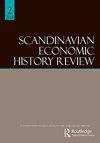IF 1
Q4 ECONOMICS
引用次数: 0
摘要
不了解人就不能了解人。尼尔斯•卡尔森(Nils Karsson)则考察了瑞典经济学家埃里克•达姆海姆(Erik dahmsamn, 1906-2005)的观点,以及达姆海姆强调实证研究在经济理论讨论中的重要性的方式。在以方法为导向的最后一章中,ha本文章由计算机程序翻译,如有差异,请以英文原文为准。
Danmark som søfartsnation – Fortællinger, interesser og identitet gennem 250 år
cannot be understood without understanding people. Nils Karsson, for his part, examines the views of the Swedish economist Erik Dahmén (1906–2005) and the way Dahmén emphasised the importance of empirical research in the discussion of economic theory. In the last method-oriented chapter,Håkan Lindgren examines the distribution of household wealth and the importance of including negative wealth in the calculation. None of these chapters focus solely on methodological issues; instead, they emphasise reflection on method and research trends. For the most part, these perspectives are related to sources for and perspectives on historical research. The following five chapters are qualitative case studies with empirical contributions to specific discussions. First,Martin Jes Iversen looks at the networking of shipping companies during the first globalisation. According to him, networks were important means of operating in international trade before formal institutions for cross-border trade. Bengt Åke Berg examines the Swedish sales cooperative’s fight against producer cartels. As a result, the co-op expanded its operations to the manufacturing of margarine, rubber products and flour, becoming a cooperative conglomerate. Jari Ojala, by contrast, examines the problems of export shipping and changes in the logic of Finnish shipping. According to him, Finnish paper industry exports moved to the modern industrial shipping model in the 1970s. This meant that transportation specialised in certain products, such as paper, largely abandoning the traditional mindset of maritime transportation. Jan Ottosson looks at interlocking directorates and boards between companies. In particular, he examines the activities of banks’ representatives in corporate governance. In the last article, Paloma Fernández Pérez and Aurelia Hernández discuss the role of legislation and taxation in the generational change of Spanish family businesses. According to them, taxation has a long-term impact on family-owned companies of different sizes. The peer-reviewed chapters are of high quality and represent good state-of-the-art research in their respective areas. Despite their strengths, these chapters are individual research papers and do not specifically seek to compile the latest trends or outline future directions for research. Together, however, they offer a rather interesting cross-section of current research themes. In my opinion, the book is interesting precisely because I became familiar with a rather wide range of different topics, while also finding some new perspectives related to my own interests. The book, which includes several very different types of chapters, is especially suitable for a reader who wants to remain aware of Nordic research currents. In this respect, it will certainly be of interest to many of the Scandinavian Economic History Review’s readers. On the whole, the book leaves the reader with a good-natured, somewhat optimistic and even downright encouraging picture of the current situation and future possibilities of economic and business history research. At the same time, however, it emphasises that while many research themes are as relevant as they were 100 years ago, historians should keep moving too.
求助全文
通过发布文献求助,成功后即可免费获取论文全文。
去求助
来源期刊

SCANDINAVIAN ECONOMIC HISTORY REVIEW
ECONOMICS-
CiteScore
1.60
自引率
16.70%
发文量
20
期刊介绍:
Scandinavian Economic History Review publishes articles and reviews in the broad field of Nordic economic, business and social history. The journal also publishes contributions from closely related fields, such as history of technology, maritime history and history of economic thought. Articles dealing with theoretical and methodological issues are also included. The editors aim to reflect contemporary research, thinking and debate in these fields, both within Scandinavia and more widely. The journal comprises a broad variety of aspects and approaches to economic and social history, ranging from macro economic history to business history, from quantitative to qualitative studies.
 求助内容:
求助内容: 应助结果提醒方式:
应助结果提醒方式:


